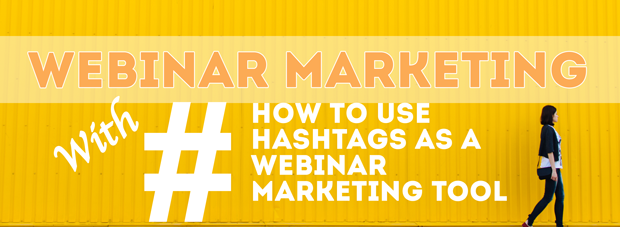If you research marketing online, it will not take you long to run into a hashtag. These cryptic tags are now appearing everywhere. What are hashtags really, and how can you use them to your advantage? Keep reading for a crash course in webinar hashtags 101.
What Is a Hashtag?
According to Google, a hashtag is a word or phrase preceded by a hash or pound sign and used to identify messages on a specific topic. Social media sites like Twitter and Facebook allow you to search by hashtag to find messages related to particular topics. Maybe you feel like your online marketing efforts are working just fine without hashtags; this is a shortsighted opinion.
Why Do Hashtags Matter?
Hashtags should matter to you because your competitors are using them. Any time you fail to use one, you open the door for a competitor to steal your lead. A quick Google search reveals a startling statistic; social media posts with hashtags are two times more likely to be shared then posts without hashtags. This means that using hashtags can have an enormous impact on your marketing campaigns. Hashtags are not just for marketing aimed at young people either; according to Pew Research Center, the fastest-growing demographic on Twitter, where hashtags really took off, is currently adults over 50 years of age. No matter who you are communicating with, using hashtags appropriately makes sense.
Measuring the Impact of Hashtags
Using hashtags can be tricky. At first, you may want to include as many hashtags as possible; this is a mistake. If you want to learn what works, do some research to find out what works. There are dozens of tools available to help you find out what is working for others. One of the most popular is Hashtagify.me. This tool lets you find hashtags related to your topic by analyzing the top 1% of Twitter traffic. 1% may not seem like much, but it represents 5 million tweets per day. You can get started right away by visiting http://hashtagify.me/.
How NOT to Use Hashtags
Anything that can be done right can also be done poorly. Here are three common mistakes that you can avoid:
- Do not overuse hashtags
Use one or two hashtags, no more. Using more hashtags can actually reduce the impact of your content and make you seem desperate for attention.
- Do not use unrelated hashtags
Some people tag their content with dozens of topics, hoping to attract attention. When you use a hashtag, make sure that it has something to do with the content you are tagging.
- Do not use long hashtags
By keeping your hashtags short and readable, you make it easy for people to remember and share them.
How to Pick a Good Hashtag
Good hashtags are meaningful, memorable and material; in other words, keep them short and to the point. Do you think you have a clever hashtag? Always be sure to verify it first; make sure no one has already used your clever hashtag before you proceed. TagDef is an essential tool for this job; you can find it here: http://tagdef.com/.
For the moment, hashtags are a useful marketing tool. Failing to use them to your advantage is a mistake that you cannot afford to make.
